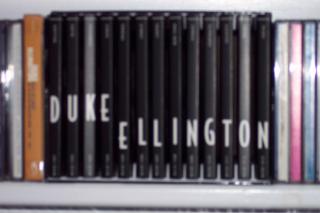Thursday, August 25, 2005
Thank You, France
 I consider myself reasonably well informed about pop music, at least for a non-critic. I know I've been left far behind by the last couple of years of iPod snob culture, as described by the dumbest Bill Murray, but I hold my own fairly well thanks to sites like Pitchfork, a subscription to The Big Takeover and friends who are passionate about rock, hip hop, reggae, etc. A three-year stint as a d.j. at a local pirate radio station also helped. I've become much more selective about my actual purchases in the last decade, but I still know my Broken Social Scene from my Futureheads from my MF Doom. I sometimes feel I know the basic contours perhaps a bit too well--it's hard to get completely excited about a hot new band when I can decode their record collections on first listen.
I consider myself reasonably well informed about pop music, at least for a non-critic. I know I've been left far behind by the last couple of years of iPod snob culture, as described by the dumbest Bill Murray, but I hold my own fairly well thanks to sites like Pitchfork, a subscription to The Big Takeover and friends who are passionate about rock, hip hop, reggae, etc. A three-year stint as a d.j. at a local pirate radio station also helped. I've become much more selective about my actual purchases in the last decade, but I still know my Broken Social Scene from my Futureheads from my MF Doom. I sometimes feel I know the basic contours perhaps a bit too well--it's hard to get completely excited about a hot new band when I can decode their record collections on first listen.When it comes to jazz, though, I'm close to a novice. Like many people, I bought a few cool jazz classics during college, usual suspects like Kind of Blue and A Love Supreme. A record or two a year since then, but with no rhyme or reason. Then, a couple of years ago, my wife and I rented Ken Burns' multi-part Jazz documentary. Sure, in some ways it's a facile, musically conservative greatest hits overview. But it provided me with a key, one that has opened dozens of doors. My prior ignorance has proved essential to my current delight as I discover every new Bix Beiderbecke, James P. Johnson or Jimmy Rushing. While the genre's creative peak may be neccesarily limited, from, say, Armstrong's fanfare on West End Blues to some nebulous point in the late 60s or early 70s, the amount of work available within those brackets is almost overwhelming. There are individual jazz musicians who give me that feeling.
Duke Ellington, for instance. Like Louis Armstrong, he's very nearly a musical genre unto himself. Take a look at his AllMusic discography and you tell me where to begin. Fortunately, it seems you can't go wrong. I took some shots in the dark with a live disc of Cotton Club recordings from 1928, a 3-disc collection of his early 40s band, and a single-disc career overview that covers so much ground over a 45-year span it's almost incomprehensible.
That's why I'm grateful to the French, or at least one label, Masters of Jazz. I recently got this 13-disc, 256-track collection brand-new for $25 at a local used record store. It covers Duke's work from 1928 though 1948, from his "jungle" accompaniments for the Cotton Club dancers to his more ambitious and complex suites from the mid-1940s. Each disc covers a particular aspect of his music: Ballads, Composer, Blues, New York, Swing, etc. Is this why reviewers gave the set weak marks? AllMusic granted 2 out of five stars. With no point of comparison, I don't know if there are problems with the audio fidelity. I don't know if superior, contemporaneous versions of these tunes exist elsewhere. I don't know if critics were bothered by somebody slapping together a bunch of Ellington mix tapes based on arbitrary conceits, or if the set simply paled in comparison to the official 27-disc commemorative set RCA released the same year. All I know is that this music is brilliant. Some of it is good enough to make you cry, giggle, become sexually excited, angry, happy, and mournful all at once. There's the way Duke's plunking piano segues into the confident swing of the brass on a relative trifle like 1935's "Tootin' Through the Roof". Cootie Williams' wah-wah trumpet solo on "Echoes of Harlem." On and on through nearly 14-1/2 hours of music. The extensive liner notes seem serious enough. The themes and track selections seem well-reasoned, at least to me. And let's face it, the packaging rules, with each CD's spine spelling the guy's name when they all sit in the slipcase. If you see this collecting dust on a box set shelf somewhere, and you're anything less than a jazz expert, buy it. It would be a steal at $50.
Now I'm just waiting for someone to come along and tell me this is actually a set of knock-offs done by an Ellington tribute band from Estonia in 1978.